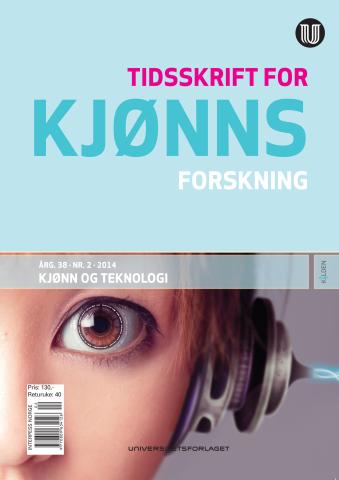Gender and technology

Articles
Anne-Jorunn Berg:
What happend to the the Cyborg? On feminist theories of materiality
The Cyborg – the naughty girl which bounced around in cyberspace – where did she go? Did she just fade away? In this article I argue that what today is called "new materialism" or the "material turn" can take advantage of insights from Donna Haraway’s works that are often forgotten, especially with regard to the distinction between nature and culture, the human and the non-human. First, I want to highlight the context of the Cyborg, that is, stories that cling to the Cyborg, and hence feminist theories of materiality. Next, I discuss how the renewed interest for materiality may open up new possibilities for feminist research. Here, Karen Barads "agential realism" is crucial, and I will examine the concept in more depth. In conclusion, I highlight some challenges I see in light of the fact that the inspiration for Barad’s work comes from quantum mechanics. These are challenges that the Cyborg through the concept of the materialsemiotic resolves in different and perhaps more adequate ways given the context of feminist theory and politics.
Keywords: Feminist theory, materiality, science and technology studies, cyborg
Ingvil Førland Hellstrand:
Political monsters. Passing as human in the science fiction TV series Star Trek and Battlestar Galactica
This article identifies a shift in the mode of embodying the Other in the science fiction TV series Star Trek: The Next Generation, Star Trek: Voyager and Battlestar Galactica: from visibly marked difference to technological hybridization to passing. As a genre, science fiction is full of political monsters: nonhuman characters that embody the Other in ways that exposes how an ontological understanding of the «human» as an exceptional subject is embedded in historical norms and ideologies. I suggest that science fiction provides a particular lens through which it is possible to con-sider questions about identity and belonging at stake in the dynamics of passing and Othering humanness. I am particularly concerned with how the impact of technology in and on the body contributes to challenge the human as a stable and fixed being.
Keywords: Passing, gender, identity, technology, ontology, normativity, science fiction, political monsters
Ardis Storm-Mathisen and Jo Helle-Valle:
ICT use at school and in the family – a practice-theoretical study of gender
This article, based on the Norwegian part of a comparative Nordic research project, analyses various ICT practices among youths in a suburb in Oslo. The analysis applies a gender perspective that draws on practice theory and argues for a non-gender-centric gender perspective. This implies that gender is always approached as part of specific social fields. The research is built on surveys, inter-views and fieldwork. The results demonstrate that gender is an important factor in accounting for differences in ICT use, but to what extent and in what ways gender plays a role are affected by various other social factors.
Keywords: Gender, gendering, ICT, practices, families, homes, school